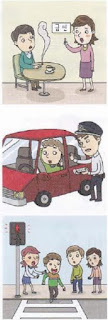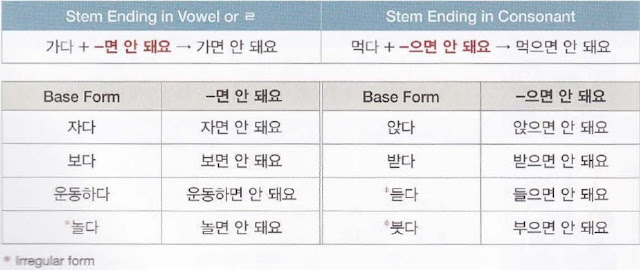 실내에서 담배를 피우면 안 돼요.
실내에서 담배를 피우면 안 돼요.
Smoking indoors is not allowed.
운전 중에 전화하면 안 돼요.
Using the phone while driving is not allowed.
지금 길을 건너면 안 돼요.
You may not cross the street now.
Grammar Focus:
-(으)면 안 되다 expresses the prohibition or limitation of a particular action of the listener. It also can represent social conventions or common sense dictating that behavior or state is prohibited or not tolerated. It corresponds to ‘may not’ or ‘not allowed to’ in English. When the stem ends in a vowel or ㄹ, -면 안 되다 is used, and when the stem ends in a consonant, -으면 안 되다 is used.
 A: 수업 시간에 영어로 말해도 돼요?
A: 수업 시간에 영어로 말해도 돼요?
May I speak in English during class?
B: 수업 시간에는 영어로 말하면 안 돼요. 한국말을 하세요.
During class, you may not speak in English. Please speak in Korean.
A: 한국에서는 밥을 먹을 때 코를 풀면 안돼요.
In Korea, you’re not supposed to blow your nose when eating.
B: 아, 그래요? 몰랐어요. Oh, really? I didn’t know that.
A: 도서관에서 얘기하면 안 돼요.
You’re not allowed to talk in the library.
B: 아, 죄송합니다.
B Okay, I’m sorry.
Notes:
-(으)면 안 되다 can be used in the double negative form, that is, -지 않으면 안 되다 to emphasize that a particular behavior must be performed.
• 8월은 휴가철이니까 비행기 표를 미리 사지 않으면 안 돼요. (= 표를 미리 사야 돼요.)
August is vacation season, so (you) must buy plane tickets in advance. (Plane tickets have to be bought in advance.)
• 병이 심각해서 수술하지 않으면 안 돼요. (= 수술해야 돼요.)
Because the illness is serious, surgery must be performed. (We have to perform surgery.)
• 다음 주에 중요한 시험이 있어서 공부하지 않으면 안 돼요. (= 공부해야 돼요)
Because (I) have an important test next week, I must study. (I have to study.)
